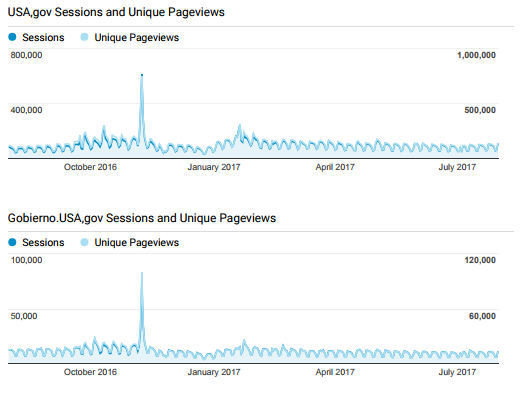USA.gov and GobiernoUSA.gov Measure Content Efficiency With New KPI Metric
This post was originally published on the USAGov blog.
After our content team moved to a more agile method of working, we also started to look at the metrics we use to measure the success of our work. To help us with that, our analytics team developed a new metric we’re experimenting with called the content efficiency metric.
This metric is a key performance indicator (KPI) that we’re hoping can help guide our content decisions. Content is our most “expensive” product to produce and maintain. It feeds our websites and our contact center’s knowledge base, and we want to make sure we’re being as efficient as possible in how we manage it.

The metric takes into account the outcomes of our work in terms of (1) unique pageviews on USAGov and USAGov en Español (formerly known as GobiernoUSA.gov), and (2) how many times a piece of content was used to help answer a contact center query.
It also takes into account the amount of work done to get those outcomes by dividing the amount of use our content got by the amount of content we were maintaining at that time. That’s why it’s called an “efficiency metric.” It’s the ratio of the outcome of our work on our original content versus the amount of work it took to make the content.
The hope is that the KPI can guide work choices. In general:
- Keep the number of pieces of content that we manage down.
- Jettison low performing content.
- Update existing content to do better.
- Avoid adding too much content without deleting an equal number of low performers.
Our goal is to maintain a knowledge base of content people really want to use and make sure they can find it. We’re hoping this metric will help us make sound decisions to get us there. We’re in the early stages of using it, and we’ll share updates as we go.
Jessica Milcetich is the Product Owner of USAGov/GSA.

